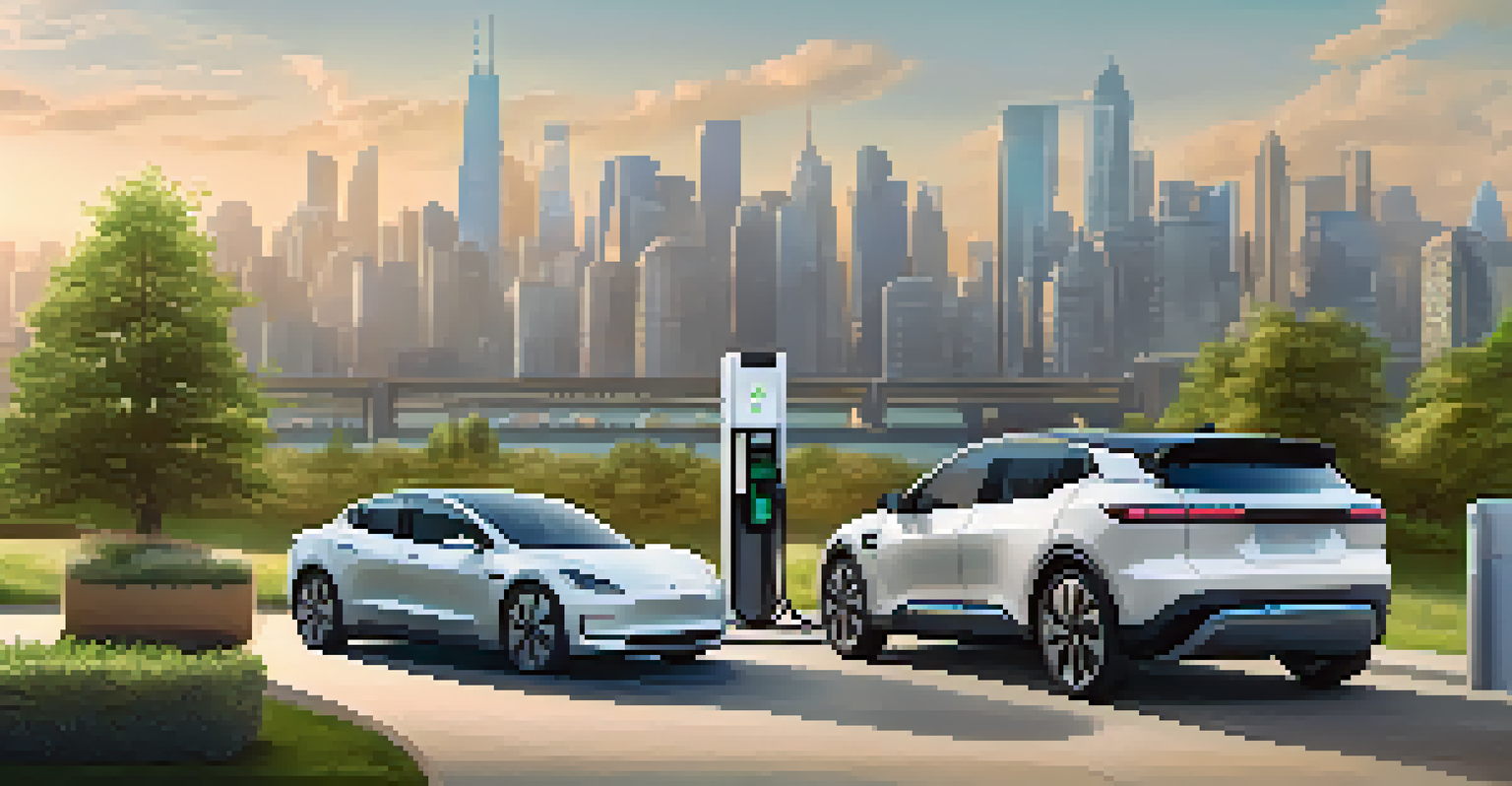The Future of Car-Sharing: A Sustainable Transportation Model

Understanding Car-Sharing and Its Growing Popularity
Car-sharing is a concept that's gaining traction as urban areas become more congested. It allows individuals to rent vehicles for short periods, making it a flexible alternative to owning a car. With the rise of mobile apps, accessing a shared vehicle has never been easier, appealing to those who prefer convenience and cost savings.
The best way to predict the future is to create it.
This trend is particularly popular among younger generations, who are prioritizing experiences over possessions. Many see car ownership as a burden, especially when public transportation options are available. As cities look to reduce traffic and pollution, car-sharing presents an attractive solution to meet these challenges.
Moreover, car-sharing models often include electric and hybrid vehicles, aligning with sustainability goals. This shift not only reduces emissions but also encourages users to adopt greener habits. As awareness of climate change grows, so does the appeal of car-sharing as a responsible choice.
The Environmental Benefits of Car-Sharing Programs
Car-sharing can significantly reduce the number of vehicles on the road, leading to lower carbon emissions. A single shared vehicle can replace multiple privately owned cars, which means fewer resources are used in manufacturing and maintaining cars. This reduction in overall vehicle numbers also leads to less congestion and lower levels of air pollution.

Additionally, shared vehicles are more likely to be fuel-efficient or electric, further enhancing their environmental benefits. By promoting the use of cleaner transportation options, car-sharing helps cities move towards their sustainability goals. Users can take pride in knowing they're making a positive impact on the environment.
Car-Sharing Reduces Urban Congestion
Car-sharing offers a flexible alternative to car ownership, helping to alleviate traffic and pollution in crowded urban areas.
Moreover, car-sharing encourages users to rethink their transportation needs. When people rely less on personal vehicles, they often opt for public transport, cycling, or walking, contributing to healthier lifestyles and communities. This holistic approach to transportation makes car-sharing a win-win for both the environment and public health.
Technological Innovations Driving Car-Sharing Forward
Technological advancements are revolutionizing the car-sharing landscape. Mobile applications that allow users to locate, book, and unlock vehicles with a few taps have made the process seamless and user-friendly. This convenience encourages more people to consider car-sharing as a viable option.
We do not inherit the earth from our ancestors; we borrow it from our children.
Furthermore, the integration of smart technology in vehicles enhances user experience. Features like real-time availability tracking and remote diagnostics ensure that vehicles are well-maintained and ready for use. These innovations not only improve user satisfaction but also streamline operations for car-sharing companies.
In addition, advancements in data analytics help companies better understand user behavior and preferences. By leveraging this information, car-sharing services can optimize their fleets and services, ensuring that they meet the needs of their customers effectively. This data-driven approach is paving the way for more tailored and efficient car-sharing solutions.
Challenges Facing the Car-Sharing Industry
Despite its many benefits, the car-sharing industry is not without challenges. One major hurdle is the issue of vehicle maintenance and cleanliness. Ensuring that vehicles are in good condition for users is crucial, as a poor experience can deter future use. Companies must implement robust maintenance protocols to address this concern.
Another challenge is the need for adequate parking and infrastructure. In densely populated urban areas, finding a suitable parking space can be a significant barrier for both users and providers. Local governments and car-sharing companies need to collaborate to create dedicated parking solutions that facilitate easy access to shared vehicles.
Environmental Benefits of Sharing
By replacing multiple privately owned vehicles, car-sharing significantly cuts carbon emissions and promotes the use of electric and hybrid cars.
Finally, public perception and awareness can also hinder growth. Many individuals may not fully understand how car-sharing works or its benefits. Education and outreach campaigns can play a vital role in changing mindsets and encouraging more people to embrace this sustainable transportation model.
The Role of Policy in Promoting Car-Sharing
Government policies play a crucial role in shaping the future of car-sharing. By implementing supportive regulations, cities can encourage the growth of shared mobility options. This might include creating designated parking spaces, offering incentives for electric vehicle usage, or reducing fees for shared vehicles.
Moreover, integrating car-sharing into public transportation systems can enhance its appeal. By providing seamless connections between various transport modes, cities can create a more holistic transportation network. This can lead to increased ridership and greater acceptance of shared mobility options.
In addition, policies that promote sustainable urban planning can foster an environment where car-sharing thrives. Designing walkable neighborhoods and enhancing public transport infrastructure can reduce reliance on personal vehicles, further paving the way for car-sharing to flourish.
The Future of Car-Sharing: Trends to Watch
As we look ahead, several trends are poised to shape the future of car-sharing. One significant trend is the increasing popularity of electric vehicles within shared fleets. As battery technology improves and charging infrastructure expands, we can expect a surge in electric car-sharing options, appealing to environmentally conscious users.
Additionally, the rise of autonomous vehicles could revolutionize the car-sharing model. Imagine a future where self-driving cars pick you up at your location and drop you off at your destination. This could greatly enhance convenience and efficiency, making car-sharing even more appealing.
Tech Innovations Enhance Car-Sharing
Advancements in mobile apps and data analytics are making car-sharing more user-friendly and efficient, encouraging its wider adoption.
Finally, the integration of artificial intelligence (AI) into car-sharing services may lead to personalized user experiences. AI could analyze user habits and preferences to suggest optimal vehicle choices or routes, making the service more tailored and efficient. These trends signal an exciting future for car-sharing, one that prioritizes sustainability and user satisfaction.
How Individuals Can Embrace Car-Sharing Today
Even as car-sharing evolves, individuals can start embracing this model now. If you're considering car-sharing, begin by exploring local services to find one that suits your needs. Many platforms offer various vehicle options, allowing you to choose what best fits your lifestyle, whether it's a compact car for city driving or a larger vehicle for a weekend getaway.
Moreover, sharing rides with friends or family can further enhance the car-sharing experience. By pooling resources, you can save money, reduce your carbon footprint, and enjoy time together on the road. This collaborative approach not only makes car-sharing more enjoyable but also fosters a sense of community.

Lastly, stay informed about the latest developments in car-sharing and its benefits. Join local initiatives or community groups focused on sustainable transportation. By becoming an advocate for car-sharing, you can help promote this innovative model, encouraging others to join the movement towards a more sustainable future.